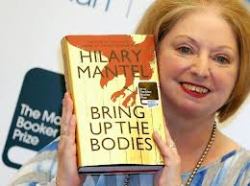A Review: Bring Up The Bodies
Historical fiction can be historically bad. You only have to speak to a Medieval History professor about The Da Vinci Code to witness the anger it can cause. Common misrepresentations of the past can cause some historians to foam at the month, like the belief that witches were burnt at the stake (they weren’t, they were hung). It’s unusual, then, that a historical book emerges that is praised as brilliant from historians, literary figures and the general public alike, and this has what’s happened with Hilary Mantel’s Bring up the Bodies.
The book is a sequel to Wolf Hall, which won the Man Booker prize, as did Bring up the Bodies, making Hilary Mantel the first author to ever win the prize for two consecutive books, and also the first female to ever win the prize twice. It has won Costa Book of the Year and is nominated for the Women’s Prize for Fiction. So it’s had a hell of a lot of attention and praise given to which, for me, is all certainly deserved.
First off there is the fact that she takes the Tudors, an era which has had endless interpretations, and manages to make it truly exciting. Bring up the Bodies follows the fall of Anne Boleyn, her rise having been depicted in Wolf Hall, through the eyes of Thomas Cromwell. You feel the mood turn against Boleyn and the fear in the court as the King’s mood starts to change and everyone becomes a potential headless victim. Its depiction of Cromwell as Machiavellian might seem over-done, but Mantel’s brilliance is in showing that this was the only way to survive during the reign of a temperamental king.
Mantel’s writing style also helps build the mood. Everyone knows that Boleyn, along with several of her allies, end with their heads been chopped as a result of the King wanting to be free of her, yet Mantel’s frequent use of the present tense helps to keep the tension up. We might know what’s going to happen but the characters certainly don’t, and the present tense helps us remind us of this.
One of the scenes in the book sticks in my mind, like only a masterful constructed scene can. Cromwell has gone to visit Katherine of Aragon, who is being kept under house arrest and separated from her daughter and friends for her refusal to let the King go. Mantel manages to paint the scene with an eerie sense of foreboding; this might be because we know that Boleyn’s fate is much worse but Mantel also makes it clear that Katherine knows the King and knows he will get bored of Anne. Mantel makes us see it and also makes Cromwell see it. It’s one of the most striking scenes I can remember.
Historical fiction is sometimes said to be an oxymoron. Mantel manages to make something that sticks with most historical facts and still manages to entertain. She makes the public understand that faction played part in the Henrican Court whilst also showing the childishness of Henrys decisions. In truth, the historical and literary genius of the work doesn’t really matter. Just get lost in the mood of the work, as it is a truly amazing achievement that deserves all the praise it can get. If there is one flaw, it’s that it ends. But don’t worry, the fall of Cromwell is coming.


